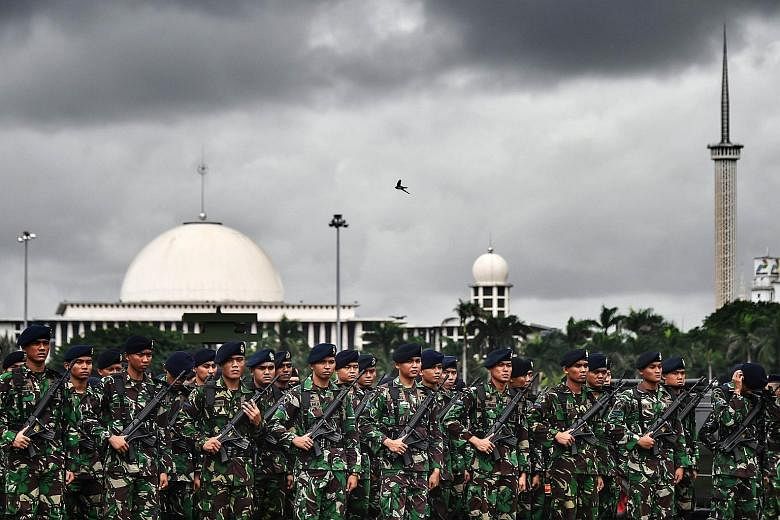The lion's share of troops involved in anti-terror operations in Central Sulawesi, as well as those sent to fight forest fires in Kalimantan and Sumatra, come from the Tentara Nasional Indonesia (TNI), or Indonesian military.
But new research shows that it is in fire-fighting efforts and other civil affairs, or operations not related to national defence, that the TNI is making its real mark in the lives of ordinary Indonesians today.
An independent study by researchers from Heyokha Brothers, a Jakarta-based investment fund management company, found that the military, by helping to distribute subsidised fertilisers, free seeds and other government aid to villages in poorer areas in Java, has been able to help alleviate poverty.
The free corn seeds and subsidised fertilisers, for instance, have raised the productivity of local farms, while shaving off up to 30 per cent from total planting costs.
As a result, the TNI has helped to raise income levels of farmers through higher agricultural outputs, said Heyokha Brothers principal consultant Wuddy Warsono last Friday.
"With improved yields, we estimate farmers' income could increase up to three times the current level," Mr Wuddy added, referring to a sample study from corn farmers in Desa Putih in East Java province.
Heyokha Brothers' research, which was released last month, involved a survey of more than 200 farmers from villages across Java.
Since being elected in 2014, President Joko Widodo has deployed the military to assist in the implementation of government projects across more than 500 regencies and cities.
One of those initiatives was to get the army to clamp down on illegal hoarding and speculation of staple food prices, which had led to artificially inflated prices for rice.
To fend off speculators, the Babinsa, or small army units, were sent to intercept speculators and middlemen, approaching farmers directly to sell rice stocks at a fair price to local branches of the Bulog, or state food agency, which then sold the rice at a lower cost to villagers.
Involving the TNI in agriculture, however, has not been without controversy. A recent report by the Institute for Policy Analysis of Conflict, said agents from the Agriculture Ministry have complained that soldiers were taking over their jobs.
The report also recorded some unhappiness among TNI troops who said that they did not sign up with the military to work in farms.
Human rights activists have also criticised the decision to involve the TNI in food security over concerns that the move could pave the way for an unhealthy involvement of the military in civilian affairs.
This, even as the TNI had yet to complete its own internal reforms.
"The idea of involving the TNI in stabilising food prices could be in violation of law... (and) also compromise efforts to make the TNI a professional force," Institute for Policy Research and Advocacy researcher Wahyudi Djafar once said.
Activating the TNI to assist local governments, however, has helped to resolve longstanding abuses as well as ease the flow of aid for local communities, said Mr Wuddy.
Besides food security, Mr Joko has also deployed thousands of troops to help fight plantation and forest fires raging in Sumatra and Kalimantan during last year's haze crisis, as well as to support the police in the massive manhunt in Poso for militants, including Indonesia's most wanted terrorist Santoso.
According to the Heyokha Brothers research, the TNI's ability to mobilise manpower and reach across the vast Indonesian archipelago to provide assistance in times of emergency makes it an invaluable resource for the President.
While critics may say the military's expanded involvement is reminiscent of former President Suharto's authoritarian regime, marked by human rights abuses, almost all the farmers who were polled welcomed the troops' presence in the villages.
Locals regard the TNI as a "clean institution" because, unlike the regional authorities, "the army gets things done", said Mr Wuddy.

